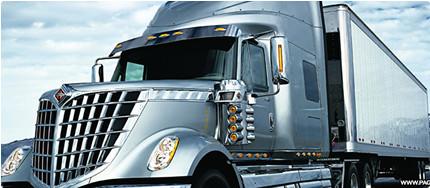New! High Road 2.0! We have a new version of this program. You can find it here: High Road 2.0
2.19 Staying Alert and Fit to Drive
Driving a vehicle for long hours is tiring. Even the best of drivers will become less alert. Following are things you can do to help you stay alert and safe.
Be Ready to Drive
Get enough sleep:
Leaving on a long trip when you are already tired is dangerous. If you have a long trip scheduled, make sure you get enough sleep before you go. Most people require 7-8 hours of sleep every 24 hours.
Schedule trips safely:
Your body gets used to sleeping during certain hours. If you are driving during those hours, you will be less alert. If possible, try to schedule trips for the hours you are normally awake. Many heavy motor vehicle accidents occur between midnight and 6 a.m. Tired drivers can easily fall asleep at these times, especially if they do not regularly drive at those hours. Trying to push on and finish a long trip at these times can be very dangerous.
Test Your Knowledge
- What are some things to do at an accident scene to prevent another accident
- Name two causes of tire fires?
- What kinds of fires are B:C extinguishers not good for?
- When using your extinguisher, should you get as close as possible to the fire?
- Name some causes of vehicle fires?
These questions may be on the written exam. If you cannot answer all of them, study sections 2.17 and 2.18
Avoid medication:
Many medicines can make you sleepy. Those that do have a label warning against operating vehicles or machinery. The most common medicine of this type is an ordinary cold pill. If you have to drive with a cold, you are better off suffering from the cold than from the effects of the medicine.
Keep cool:
A hot, poorly ventilated cab can make you sleepy. Keep the window or vent cracked or use the air conditioner if you have one.
Take breaks:
Short breaks can keep you alert. But the time to take them is before you feel really drowsy or tired. Stop often. Walk around and inspect your vehicle. It may help to do some physical exercises. When you are sleepy, trying to “push on” is far more dangerous than most drivers think. It is a major cause of fatal accidents. Following are some important rules:
- Stop to sleep - When your body needs sleep, sleep is the only thing that will work. If you have to make a stop anyway, make it whenever you feel the first signs of sleepiness, even if it is earlier than you planned. By getting up a little earlier the next day, you can keep on schedule without the danger of driving while you are not alert.
- Take a nap - If you cannot stop for the night, at least pull off at a safe place, such as a rest area or truck stop, and take a nap. A nap as short as a half-hour will do more to overcome fatigue than a half-hour coffee stop.
- Avoid drugs - There are no drugs that can overcome being tired. While they may keep you awake for a while, they will not make you alert. And eventually, you will be even more tired than if you had not taken them at all. Sleep is the only thing that can overcome fatigue.
Alcohol and Driving
Drinking alcohol and then driving is a very serious problem. People who drink alcohol are involved in traffic accidents resulting in more than 20,000 deaths annually. You should know:
- How alcohol works in the human body.
- How it affects driving.
- Laws regarding drinking and driving.
- Legal, financial and safety risks of drinking and driving.
How alcohol works:
Alcohol goes directly from the stomach into the blood stream. A drinker can control the amount of alcohol that he/she takes in by having fewer drinks or none. However, the drinker cannot control how fast the body gets rid of alcohol. If you have drinks faster than the body can get rid of them, you will have more alcohol in your body, and your driving will be more affected. The amount of alcohol in your body is commonly measured by the blood alcohol concentration (BAC).
What determines BAC:
BAC is determined by the amount of alcohol you drink (more alcohol means a higher BAC), how fast you drink (faster drinking means a higher BAC) and your weight (a small person does not have to drink as much to reach the same BAC).
What constitutes a “drink”:
A “drink” refers to the alcohol in a drink that affects human performance. It does not make any difference whether the alcohol comes from a couple of beers or two glasses of wine or two shots of hard liquor. All the following drinks contain the same amount of alcohol:
- 12-oz. glass of 5% beer
- 5-oz. glass of 12% wine
- 1 1/2-oz. shot of 80-proof liquor
Alcohol and the brain:
Alcohol affects more and more of the brain as BAC builds up. The first part of the brain affected controls judgment and self control. One of the bad things about this is it can keep drinkers from knowing they are getting drunk. As BAC continues to build up, muscle control, vision and coordination are affected more and more. Eventually, a person will pass out.
How alcohol affects driving:
All drivers are affected by drinking alcohol. Alcohol affects judgment, vision, coordination and reaction time. It causes serious driving errors, such as:
- Increased reaction time to hazards.
- Driving too fast or too slow.
- Driving in the wrong lane.
- Running over the curb.
- Weaving.
- Straddling lanes.
- Quick, jerky starts.
- Not signaling, failure to use lights.
- Running stop signs and red lights.
- Improper passing
These effects mean increased chances of an accident and chances of losing your driverʼs license. Statistics show that the chance of an accident is much greater for drivers who have been drinking than for drivers who were not.
The Truth About Alcohol
FALSE
- Alcohol increases your ability to drive.
- Some people can drink a lot and not be affected by it.
- If you eat a lot first, you will not get drunk.
- Coffee and a little fresh air will help a drinker sober up.
- Stick with beer – it is not as strong as wine or whiskey.
TRUE
- Alcohol is a drug that will make you less alert and reduce your ability to drive safely.
- Everyone who drinks is affected by alcohol.
- Food will not keep you from getting drunk.
- Only time will help a drinker sober up. Other methods just do not work.
- A few beers are the same as a few shots of whiskey or a few glasses of wine.
The below list should be memorized.








 TT On Facebook
TT On Facebook